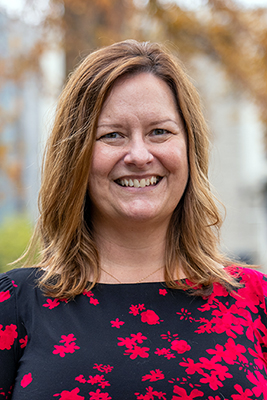Faculty Profile
Catrina Hamilton-Drager
Associate Professor of Physics and Astronomy (2006)Contact Information
Tome Scientific Building
717-254-8935
Bio
Professor Hamilton-Drager's research focuses mainly on young stars in the process of forming. She has examined the rotation rates of stars in clusters of different ages to trace the evolution of angular momentum. Stars naturally spin up as they contract while forming (like the ice skater who pulls in her arms). However, some stars are observed to spin fast (P < 2 days), while some spin slowly (3 < P < 14 days). Her research is exploring the interaction of the star's magnetic field and its circumstellar disk, or the material out of which planets will eventually form. Looking at stars in clusters of varying ages (1, 3, 5, 10 million years) allows one to assess exactly how long it takes for stars spin up and thereby infers a possible length of time associated with planet formation. As the disks dissipate, due to planet formation or other factors (high energy winds from nearby hot stars), the stars are freed and allowed to spin up. Professor Hamilton-Drager is probably best known for her pioneering work on the young stellar system known as KH 15D. The KH 15D system is a binary system surrounded by a circumbinary ring. Its light output has been evolving since ~1960 as a result of the gradual precession of the ring in front of the orbit of the binary. The ring acts as a natural coronagraph and provides us with information about the close environment of one of the stars. Her spectral observations show that star A's magnetosphere varies with time, sometimes compact (~1 stellar radius), while at other times, substantially larger (~2 stellar radii or more). There is also evidence for enhanced accretion following periastron passage (generally larger flux values during egress than ingress) as predicted by the models of gas flow from a circumbinary disk through a gap to the binary.
Education
- B.A., Mount Holyoke College, 1991
- M.S., Arizona State University, 1994
- Ph.D., Wesleyan University, 2003
2025-2026 Academic Year
Fall 2025
FYSM 100 First-Year Seminar
The First-Year Seminar (FYS) introduces students to Dickinson as a "community of inquiry" by developing habits of mind essential to liberal learning. Through the study of a compelling issue or broad topic chosen by their faculty member, students will:
- Critically analyze information and ideas
- Examine issues from multiple perspectives
- Discuss, debate and defend ideas, including one's own views, with clarity and reason
- Develop discernment, facility and ethical responsibility in using information, and
- Create clear academic writing
The small group seminar format of this course promotes discussion and interaction among students and their professor. In addition, the professor serves as students' initial academic advisor. This course does not duplicate in content any other course in the curriculum and may not be used to fulfill any other graduation requirement.
PHYS 131 Workshop Physics
An introduction to classical mechanics using an inquiry-based, hands-on approach that combines cooperative learning with the use of computer tools for data acquisition, analysis, and mathematical modeling. Both analytic and numerical calculations are introduced for characterizing motion. A selection of kinesthetic experiments is included to enhance student learning. Topics include kinematics, Newton's laws of motion, gravitation, conservation laws, and rotational motion. Recommended for physical science, mathematics, and pre-engineering students and for biology majors preparing for graduate study. Three two-hour sessions per week. Because of the similarity in course content, students will not receive graduation credit for both 131 and 141. Prerequisite: Completion of, or concurrent enrollment in, MATH 151 or 170.
Spring 2026
ASTR 110 Stars, Galaxies, and Beyond!
Modern astronomy encompasses a wide range of fascinating topics, from cutting-edge techniques used to detect and survey exosolar planets, to advances in astrophysics that reveal tantalizing glimpses into the nature of space and the beginning and possible end of our universe as a whole. This course will look at the tools and physics that astronomers utilize, as well as the electromagnetic spectrum to explore and expand our understanding of the Universe. Students will apply fundamental ideas from physics to the Sun, as well as distant objects, both within and outside our own Galaxy. Three hours classroom, one two-hour laboratory a week. This course may count toward the astronomy minor.
PHYS 132 Workshop Physics
Workshop Physics: Matter and Fields
An introduction to thermal physics and electromagnetism using an inquiry-based, hands-on approach that combines cooperative learning with the use of computer tools for data acquisition, analysis, and mathematical modeling. Both analytic and numerical calculations are introduced for characterizing motion. A selection of kinesthetic experiments is included to enhance student learning. Topics include heat, temperature, phases of matter, kinetic theory, and heat engines; electric and magnetic fields, forces on charged particles, electrical circuits, and Ohm’s and Kirchhoff’s law; an introduction to Maxwell’s equations and electromagnetic waves.
Three two-hour sessions per week. (Students enrolled in Physics 132 who have completed Mathematics 170 are encouraged to continue their mathematics preparation while taking physics by enrolling in Mathematics 171.) Because of the similarity in course content, students will not receive graduation credit for both 132 and 142. Prerequisite: 131 and completion of, or concurrent enrollment in MATH 170.
ASTR 500 Astronomy Independent Study
